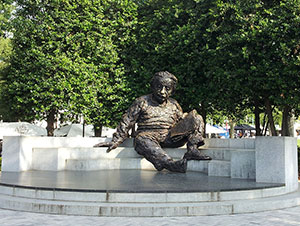Albert Einstein (1879 – 1955)
In 1952 an editor of the Japanese newspaper, Kaizo, asked Einstein to respond to the use of the atomic bomb. He wrote back with this reply:
My participation in the production of the atomic bomb consisted of one single act: I signed a letter to President Roosevelt, in which I emphasized the necessity of conducting large-scale experimentation with regard to the feasibility of producing an atom bomb.
I was well aware of the dreadful danger for all of mankind were the experiments to prove successful. Yet I felt compelled to take the step because it seemed probable that the Germans might be working on the same problem with every prospect of success. I saw no alternative but to act as I did, although I have always been a convinced pacifist.
I believe that the killing of human beings in a war is no better than common murder; but so long as nations lack the determination to abolish war through common action and find means of solving their disputes and safeguarding their interests by peaceful arrangements according to existing laws, they will continue to consider it necessary to prepare for war. They will feel compelled to engage in the manufacture of even the most detestable weapons in their fear that they may lag behind in the general arms race. Such an approach can only lead to war, and warfare today would mean universal annihilation of human beings.
Albert Einstein Memorial at the NAS
2101 Constitution Ave NW, Washington, DC 20418
GPS Coordinates: 38.896829, -77.019245
This Memorial is free and accessible 7 days a week, 24 hours a day.
The Einstein Memorial draws thousands of visitors each year and has become perhaps the NAS Building’s most recognizable symbol. The bronze sculpture depicts NAS member Albert Einstein, often called the “father of modern physics,” seated on a bench of white granite and holding a tablet with mathematical equations that symbolize three of his most important scientific contributions.
The release of atomic energy has not created a new problem. It has merely made more urgent the necessity of solving an existing one. One could say that it has affected us quantitatively, not qualitatively. As long as there are sovereign nations possessing great power, war is inevitable. This does not mean that one can know when war will come but only that one is sure that it will come. This was true even before the atomic bomb was made. What has changed is the destructiveness of war.
~ Albert Einstein
The problem with which the intellectuals of this country are confronted is very serious. The reactionary politicians have managed to instill suspicion of all intellectual efforts into the public by dangling before their eyes a danger from without. Having succeeded so far, they are now proceeding to suppress the freedom of teaching and to deprive of their positions all those who do not prove submissive, i.e., to starve them.
What ought the minority of intellectuals to do against this evil? Frankly, I can see only the revolutionary way of non-cooperation in the sense of Gandhi’s. Every intellectual who is called before one of the committees ought to refuse to testify, i.e., he must be prepared for jail and economic ruin, in short, for the sacrifice of his personal welfare in the interest of the cultural welfare of this country.
This refusal to testify must be based on the assertion that it is shameful for a blameless citizen to submit to such an inquisition and that this kind of inquisition violates the spirit of the Constitution.
If enough people are ready to take this grave step they will be successful. If not, then the intellectuals of this country deserve nothing better than the slavery which is intended for them.
~ Albert Einstein
To view History.com’s video, click on
“Einstein: Regret.”
…try to establish through international legislation the right to refuse military service in peace-time. Those who are unwilling to accept the obligation (military service) might advocate legislation which would permit them to do some strenuous or even dangerous work, each for his country or for mankind, in place of military service, to prove that their ward resistance is unselfish—a consequence of their belief that international differences can be settled other than by fighting; to prove that they do not oppose war for their personal comfort or because of cowardice or because they do not want to serve their country or humanity. If we take upon ourselves such dangerous occupations we shall be advancing far on the road to the pacification of the world.
~ Albert Einstein



